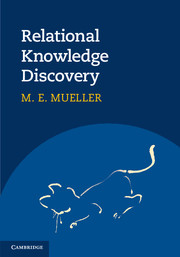3 - From data to hypotheses
Published online by Cambridge University Press: 05 July 2012
Summary
No software without a program, no program without an algorithm. No algorithm without a theory, and no theory without a clear syntax and semantics. In this chapter we define the fundamental concepts that we need to speak about knowledge discovery in a clear language without too much confusion.
If we try to put all the important information about machine learning in just a small box, it would look like this:
Machine learning
Machine learning is concerned with the problem of inducing a concept from a sample of instances of our domain. Given a classification, the task is to define a mapping that approximates an unknown target function that assigns to each object a target class label.
The outcome is a hypothesis h of a certain quality, and the process of inducing such a hypothesis crucially depends on the representation of our domain.
This rather rough picture is described in detail in the following sections.
First we need to specify what we will be talking about and the terms we will be using.
Representation
Machine learning and knowledge discovery are concerned with:
grouping objects (like entities, processes, atoms, complex structures, etc.)
from a domain (i.e., a set of such objects)
into target concepts
with respect to their properties and/or the classes they belong to.
First we need to ask ourselves how to represent our knowledge of the world. The part of the world that we live in and that we shall reason about is called the domain. To be able to talk about objects of the domain we need to have representations thereof.
Information
- Type
- Chapter
- Information
- Relational Knowledge Discovery , pp. 38 - 75Publisher: Cambridge University PressPrint publication year: 2012
